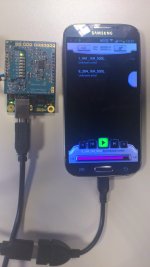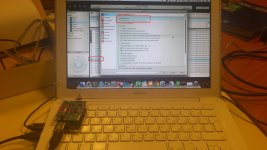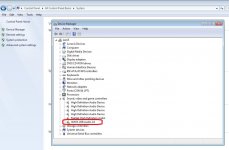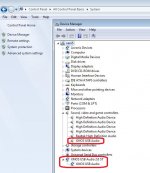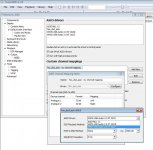Not sure it's Apple, though it could be.
@Scuba, there is definitely a problem with the XMOS board being connected directly to a USB port on a Mac: I tested with an old MacMini 2006 (USB2), newest MacBook Pro 2013 (USB3), MacbookPro 2009 (USB2).
The LED by the USB connector sometimes just gleams instead of glowing steadily. This is when the XMOS card won't be recognized. Unfortunately I couldn't figure out how to reproduce the issue - it might be related to how much power other components are drawing at the same time, but this is pure speculation.
What I was doing to make it work was plugging in and out and switching USB ports until the LED glows steady. Then I know it would work.
It always works through a powered hub. It also always works when I added an external dual power supply.
Go figure...
@Scuba, there is definitely a problem with the XMOS board being connected directly to a USB port on a Mac: I tested with an old MacMini 2006 (USB2), newest MacBook Pro 2013 (USB3), MacbookPro 2009 (USB2).
The LED by the USB connector sometimes just gleams instead of glowing steadily. This is when the XMOS card won't be recognized. Unfortunately I couldn't figure out how to reproduce the issue - it might be related to how much power other components are drawing at the same time, but this is pure speculation.
What I was doing to make it work was plugging in and out and switching USB ports until the LED glows steady. Then I know it would work.
It always works through a powered hub. It also always works when I added an external dual power supply.
Go figure...
Hi,
XMOS board was designed to meet USB standards, with some reserve about the power supply. The LED "sometimes just gleams instead of glowing steadily" does that if the input voltage is lower than 4.3V Wiki; doc. It is possible, if battery of the MAC is discharged this voltage to be dropped or the computer reduces the consumption of external drives, to save energy.
The consumption is higher, because I on purpose avoid SMPS. So the consumption is less than 400mA, which is sufficient margin to the maximum specified 500mA. When using the SMPS, the power consumption falls below 150mA, but with increased background noise caused by the regulator.
Regards,
Joro
XMOS board was designed to meet USB standards, with some reserve about the power supply. The LED "sometimes just gleams instead of glowing steadily" does that if the input voltage is lower than 4.3V Wiki; doc. It is possible, if battery of the MAC is discharged this voltage to be dropped or the computer reduces the consumption of external drives, to save energy.
The consumption is higher, because I on purpose avoid SMPS. So the consumption is less than 400mA, which is sufficient margin to the maximum specified 500mA. When using the SMPS, the power consumption falls below 150mA, but with increased background noise caused by the regulator.
Regards,
Joro
Hi Joro. There's definitely something going on here that isn't related to power limits. My builds use dedicated PS for USB & DAC, and are not detected in any of my 3 macs with nothing else USB plugged in to the computers.
Not sure what's going on, but power should not be the issue here.
Not sure what's going on, but power should not be the issue here.
My kit behaves slightly different: the led on the AK4396 does not always light-up after power-on. I have to power-cycle the power supplies 2-3 times to get it to light up.
The Ak4396 board is powered from a Salas shunt with 450 mA total current, U=5.14 V, and the XMOS board from a Salas shunt with 620 mA total current, U = 5.09 V .
It has nothing to do with the USB cable being connected or not.
I can confirm what MisterRogers said: once the combo is powered, the XMOS is not detected by the Mac OS if connected directly to the computer's USB ports (also not cable related, because I have tried 4 different cables with the same results).
The Ak4396 board is powered from a Salas shunt with 450 mA total current, U=5.14 V, and the XMOS board from a Salas shunt with 620 mA total current, U = 5.09 V .
It has nothing to do with the USB cable being connected or not.
I can confirm what MisterRogers said: once the combo is powered, the XMOS is not detected by the Mac OS if connected directly to the computer's USB ports (also not cable related, because I have tried 4 different cables with the same results).
Hi,
Sorry for my late answer, but I have to find MAC. My friend has MAC Unibody 2008, with only USB 2.0 ports. MAC OS X 10.9.1.
The LED on the AK4396 board is for the Filter, and has nothing in common with the power supply. Could you please do this: install the jumpers on both PCB boards and share the result.
If there is power supply for the USB part, and after that the USB cable is plug to the computer - one may have to wait 20 seconds, so the board can be recognized, by the computer. These 20 sec. may be annoying to someone, but they are put for compatibility between "old" and "new" hardware and different OS.
If the USB (MAC) ports are 3.0 (for a pity I can't find that MAC) there may be a problem with the recognition of the board, judging from some threads on the apple support from their official page. Here are the links:
https://discussions.apple.com/thread/5659615?start=0&tstart=90
https://discussions.apple.com/thread/5617629?start=15&tstart=0
Since I haven't tested MAC with USB 3.0 ports, I don't know what exactly happen, but from I read from your posts guys, that if one USB 2.0 hub as a "middleman", XMOS board will work through USB 3.0 port
The Mac, which I tested there weren't problems with recognition of the board, everything was smooth and according to the expectations.
Some good news for Android users.
I've tested the device with Samsung Galaxy S4, HTC One X by using this program,
https://play.google.com/store/apps/details?id=com.extreamsd.usbaudioplayerpro
I've tested it up to 384kHz and works perfect. Of course with external power supply for the USB part. If one can install this program (there is a trial) and have USB OTG, XMOS board must be working. If someone test his Android device, please share.
Regards,
Joro
Sorry for my late answer, but I have to find MAC. My friend has MAC Unibody 2008, with only USB 2.0 ports. MAC OS X 10.9.1.
My kit behaves slightly different: the led on the AK4396 does not always light-up after power-on.
The LED on the AK4396 board is for the Filter, and has nothing in common with the power supply. Could you please do this: install the jumpers on both PCB boards and share the result.
I can confirm what MisterRogers said: once the combo is powered, the XMOS is not detected by the Mac OS if connected directly to the computer's USB ports.
If there is power supply for the USB part, and after that the USB cable is plug to the computer - one may have to wait 20 seconds, so the board can be recognized, by the computer. These 20 sec. may be annoying to someone, but they are put for compatibility between "old" and "new" hardware and different OS.
If the USB (MAC) ports are 3.0 (for a pity I can't find that MAC) there may be a problem with the recognition of the board, judging from some threads on the apple support from their official page. Here are the links:
https://discussions.apple.com/thread/5659615?start=0&tstart=90
https://discussions.apple.com/thread/5617629?start=15&tstart=0
Since I haven't tested MAC with USB 3.0 ports, I don't know what exactly happen, but from I read from your posts guys, that if one USB 2.0 hub as a "middleman", XMOS board will work through USB 3.0 port
The Mac, which I tested there weren't problems with recognition of the board, everything was smooth and according to the expectations.
Some good news for Android users.
I've tested the device with Samsung Galaxy S4, HTC One X by using this program,
https://play.google.com/store/apps/details?id=com.extreamsd.usbaudioplayerpro
I've tested it up to 384kHz and works perfect. Of course with external power supply for the USB part. If one can install this program (there is a trial) and have USB OTG, XMOS board must be working. If someone test his Android device, please share.
Regards,
Joro
Attachments
Hi Joro,
Thank you for the reply.
I knew that the issue with the USB ports is Apple related, there are other USB Audio devices that do not work, too. On my PCs I did not have any problems.
I am aware of the delay when the USB cable is plugged, as I keep the Audio Midi Setup app open, to see when the XMOS board is recognized.
I will try to power the board from USB again.
Thank you for the reply.
I knew that the issue with the USB ports is Apple related, there are other USB Audio devices that do not work, too. On my PCs I did not have any problems.
I am aware of the delay when the USB cable is plugged, as I keep the Audio Midi Setup app open, to see when the XMOS board is recognized.
I will try to power the board from USB again.
Some good news for Android users.
I've tested the device with Samsung Galaxy S4, HTC One X by using this program,
https://play.google.com/store/apps/details?id=com.extreamsd.usbaudioplayerpro
I've tested it up to 384kHz and works perfect. Of course with external power supply for the USB part. If one can install this program (there is a trial) and have USB OTG, XMOS board must be working. If someone test his Android device, please share.
Regards,
Joro
I have tried this too with my Nexus 7 and Dac End R dac (I replaced the Amanero with your board) and it is working. Unfortunately this works not with Android but how the developer says "their own usb driver what is written from scratch". Google do not want to let normal usb audio in android as for example in linux.
Of course you can root the android device and load some ROM, not so easy.
Last edited:
no luck yet
Dear Joro,
I received my I2S board. Thank you.
However, I have a difficulty installing the driver. The software installer keeps asking me to unplug and plug again......but, no success so far.
Please, advice on what procedure will make the computer accept the board.
Thank you,
Roumen Sotirov
Dear Joro,
I received my I2S board. Thank you.
However, I have a difficulty installing the driver. The software installer keeps asking me to unplug and plug again......but, no success so far.
Please, advice on what procedure will make the computer accept the board.
Thank you,
Roumen Sotirov
...Please, advice on what procedure will make the computer accept the board....
Hi
Could you please check some things?
1. Do you use the driver from the website? Otherwise, you couldn't install the driver.
2. Do you provide power supply to pin11 and pin12? Otherwise, the board will not be recognized at all.
3. What is your OS
Regards,
Joro
Dear Joro,
I have a similar problem. I use Win7.
Yesterday I connented the board to my computer for the first time, and it was recognized.
I installed the XMOS driver from your site.
I was able to select the XMOS device as sound device.
Then I tried to install the foobar2000 asio drivers as in your setup guide.
Something went wrong... a foobar component was damaged and it didn't work anymore.
The XMOS device could not be recognized anymore either.
I uninstalled both foobar and the driver. To reinstall foobar, I had to erase it's application data as well.
Now I have foobar reinstalled, but still the XMOS device is not recognized. I can't install the driver again. It tells me to unplug and replug...
The green LED is shining steadily and i privide power to pin 11+12 too.
Can you figure what is wrong??
I have a similar problem. I use Win7.
Yesterday I connented the board to my computer for the first time, and it was recognized.
I installed the XMOS driver from your site.
I was able to select the XMOS device as sound device.
Then I tried to install the foobar2000 asio drivers as in your setup guide.
Something went wrong... a foobar component was damaged and it didn't work anymore.
The XMOS device could not be recognized anymore either.
I uninstalled both foobar and the driver. To reinstall foobar, I had to erase it's application data as well.
Now I have foobar reinstalled, but still the XMOS device is not recognized. I can't install the driver again. It tells me to unplug and replug...
The green LED is shining steadily and i privide power to pin 11+12 too.
Can you figure what is wrong??
Hi,
For a pity I don't know what programs you have installed on your computer. XMOS driver can't damage any program. I don't know what had happened to the foobar. Foobar is a wonderful free program and the components are written by many enthusiasts. It's possible to cross with some program or something went wrong during the installation.

In order to be easy :
Only for information: If one use only USB power from host, for the USB part and the oscillators and reclock, the board is recognized immediately. If one use an external power supply only for the oscillators and the reclock, the recognition is immediately.
I'll attach some pictures, one is before the installation of the XMOS driver, second one is when the drivers are installed and the last one is that if you use more that one USB audio device, you have to select the device that you want to use at the moment (for example: foobar).
Regards,
Joro
...
Something went wrong... a foobar component was damaged and it didn't work anymore...
For a pity I don't know what programs you have installed on your computer. XMOS driver can't damage any program. I don't know what had happened to the foobar. Foobar is a wonderful free program and the components are written by many enthusiasts. It's possible to cross with some program or something went wrong during the installation.
Now it works, without changing anything..
.. Joro mentioned somewhere that it takes 20 seconds...
In order to be easy :
...
If there is power supply for the USB part, and after that the USB cable is plug to the computer - one may have to wait 20 seconds, so the board can be recognized, by the computer. These 20 sec. may be annoying to someone, but they are put for compatibility between "old" and "new" hardware and different OS....
Only for information: If one use only USB power from host, for the USB part and the oscillators and reclock, the board is recognized immediately. If one use an external power supply only for the oscillators and the reclock, the recognition is immediately.
I'll attach some pictures, one is before the installation of the XMOS driver, second one is when the drivers are installed and the last one is that if you use more that one USB audio device, you have to select the device that you want to use at the moment (for example: foobar).
Regards,
Joro
Attachments
Hi,
Yes, you can sign to the spreadsheet
Regards,
Joro
Can I still get aboard this GB?
Yes, you can sign to the spreadsheet
Regards,
Joro
- Status
- This old topic is closed. If you want to reopen this topic, contact a moderator using the "Report Post" button.
- Home
- Source & Line
- Digital Line Level
- XMOS DSD 384 kHz / 32bit USB
